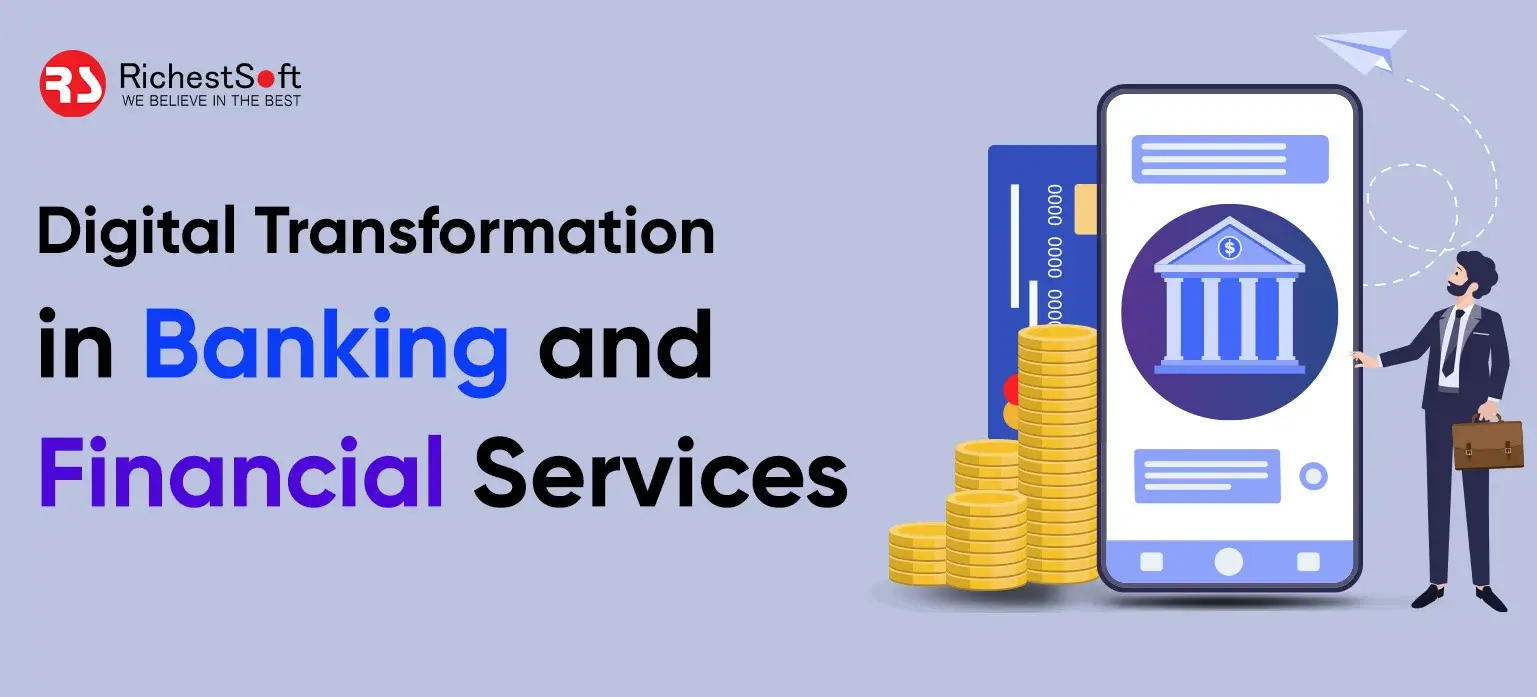February 5, 2025
Banking services, such as savings accounts, loans, bill payments, foreign exchange, cheque processing, ATM withdrawals, and customer support, used to require in-person visits or phone calls. As people’s schedules got busier, this became inconvenient.
Digital transformation in banking services bridges customers and financial services simultaneously. Due to the soaring popularity of these online banking platforms, the global market was valued at USD 17.00 billion in 2024. It can grow gradually from USD 19.98 billion in 2025 to USD 59.69 billion by 2032, exhibiting a CAGR of 16.9% during the forecast period.
Moreover, as banking services shift toward automation, even platforms must modernize their banking strategies. This blog elucidates digitizing banking services and what they bring to users’ tables. How does digital transformation in the finance industry empower growth?
Keep reading!
Why Invest In Digitally Advanced Banking Solutions
Convenience, ease of access, and speed attract users to banking services. Digitalization-enabled banking solutions maintain this relevance in the financial sector, allowing users to manage accounts, make payments, and access services anytime, anywhere.
From the business perspective, the future is all about innovation and digitalization. The growing demand for seamless, tech-driven financial services will drive the global digital banking market to a revenue size of $13.9 billion by 2026. This explains why visionary investors, such as FinTech entrepreneurs, venture capitalists, established banks, tech enthusiasts, NeoBank founders, RegTech backers, and others, are investing in modernized banking services in response to evolving times.
If you are also among them, it is important to adapt digitalization in the financial sector and align with users’ growing needs, positioning your banking solutions for long-term success in an increasingly financial world.
Tech Drivers Empowering Banking Digital Transformation
This shift towards digital banking has resulted in better user experiences and built a stronger future for financial services. The following is an in-depth knowledge about the tech drivers of digitalization in the banking industry:
Smart Payments Through Fingerprints
Fingerprint-based payments are a game-changer trend that ensures security and convenience in the banking industry. With this digitalized approach, account holders authorize transactions by scanning their fingerprints, making payments quicker and more secure.
This technology removes the need to remember PINs or passwords, saving credentials with users’ consent. Only authorized individuals can access accounts, enhancing the convenience and security of daily banking transactions.
AI Chatbots for Personalized Investment Advice
Investing in AI chatbot development is becoming a valuable asset in banking services. AI-driven chatbots can offer personalized investment advice to customers. These chatbots interact with users to understand their financial goals and offer tailored suggestions.
AI chatbots can analyze vast amounts of data, helping users make informed decisions and providing real-time investment guides. This trend makes financial advice more accessible, accurate, and available anytime.
Wearable Payments
Wearables like smartwatches and fitness trackers are among the highest trends in the coming years. Investing in wearable app development for banking and financial services will result in progressive growth. Watches are replacing the major parts of smartphones, such as taking calls, tracking fitness, and listening to music. Now, making transitions through watches is among the trends. These devices enable users to make secure, contactless payments in stores or public transport.
Technological Advancements In Banking
Technologies have also played a huge role in making banking and financial services more convenient and accurate. Businesses must use digital finance initiatives to support this digital change efficiently and improve customer experiences.
Learn how technological advancements can uplift your digital banking businesses:
Cloud Computing
Cloud computing allows banks to access resources on demand, making their operations more efficient. Business investors can easily scale their services and improve overall performance with a flexible and scalable infrastructure by starting digital banking services through cloud app development.
Artificial Intelligence (AI)
AI is changing how banks interact with customers. It helps improve customer service through chatbots and online assistants that solve problems quickly. Custom AI development enables fintech solutions to understand user behavior and detect fraud faster, making the system safer.
Big Data & Analytics
Banks use big data to understand their customers better. Analyzing spending patterns and financial needs lets them create personalized services, make smarter decisions, and improve their services. This gives customers what they want, leading to more satisfied users and business growth.
Blockchain
Investing in blockchain-based app development has made banking and financial services simpler, more secure, and more transparent. This technology ensures that transactions are safer and reduces fraud risk, boosting customer confidence. Blockchain’s transparency in banking software improves the interaction between banks and customers.
Internet of Things (IoT)
IoT connects devices and allows the audience to make easy, contactless payments. The IoT app development improves the banking experience by giving people quick access to their accounts through mobile apps and wearables. IoT enhances security and risk management, making it easier for banks to protect their customers and improve service delivery, driving industry growth.
Benefits Of Digital Transformation In The FinTech Sector
Digitalization in banking has several benefits that help businesses stay ahead in the constantly growing market. These transformations help banks run more smoothly and provide better services to customers. Here is what digital transformation has for FinTech sector:
Enhanced Customer Experience
Digital transformation helps banks deliver smooth and personalized experiences. Customers can access services anytime and anywhere, making banking more convenient and enjoyable.
Better Operational Efficiency
Automating tasks and streamlining processes make banking faster and more efficient. With such an improved operational efficiency, financial service providers focus on important goals and new ideas instead of getting stuck with repetitive manual work.
Greater Flexibility
Digital tools help banks adapt quickly to customer needs and market trends. They launch new products or services faster, keeping up with a changing world. This flexibility allows them to stay ahead in a fast-moving industry.
Stronger Security
Digitalization makes banking and financial services secure. Banks can more easily spot fraud, protect data, and comply with rules. These stronger security measures build trust and keep customer information safe.
Smarter Decisions with Data
Digital transformation gives banks access to valuable insights from customer data. These insights allow them to make smarter choices, identify new opportunities, and create effective strategies.
Key Factors Influencing Digital Transformation In Banking
The digital transformation includes unprecedented innovation ahead, which can be personalized and filled with technology-driven services. Explore these factors that persuade digitizing the banking sector:
Evolving Customer Expectations
Increasing customer expectations in digital banking transformation exhibit a growing demand for personalized experiences. As customers seek quick services, enhanced security, and greater convenience, banks must adapt by providing innovative solutions, integrating AI, and delivering real-time support to meet these shifting demands.
Growing Competition
Several fintech software and neobanks are disrupting traditional banking with user-centric financial services. This shift is forcing established banks to modernize and improve efficiency. Digital solutions are crucial for retaining current customers and attracting new ones who value convenience and innovation.
Data Security
Governments and regulators require banks to adopt digital systems prioritizing security, transparency, and fairness. Laws like GDPR and PSD2 encourage digital updates to ensure customer data stays safe and secure. These updates build trust and show customers that banks value privacy and protection.
Lowering Costs
Switching to digital solutions helps banks minimize their expenses. Automation and streamlined workflows reduce the need for manual work, saving time and money. These savings allow banks to focus on projects that drive growth and improve customer service.
RichestSoft—Empower Digital Banking Transformation With Us
The financial sector’s future will be defined by continuous innovation and adaptability. As emerging technologies become more prevalent, businesses need proficient professionals to stay competitive in the evolving market.
Richestsoft is a leading mobile application service provider with over 15 years of experience creating high-quality mobile apps. Our skilled team of professionals is proficient in advanced technologies, ensuring we deliver secure and top-tier solutions.
We offer customized services to meet each client’s unique needs, ensuring all features work flawlessly. Committed to security, we integrate reliable encryption methods and multi-level authentication into every app. Focusing on cutting-edge technology, we integrate AI, face recognition, and fingerprint security into mobile banking apps for enhanced safety.
Our user-friendly, client-centric approach guarantees timely delivery of error-free applications. We value your time and investment while ensuring complete satisfaction.
Conclusion
The potential of digitalization in banking, financial services, and FinTechs is unquestionable. We are in a transformative era in which adapting to evolving digital advancements is important.
Partnering with a reputable development company, like RichestSoft, is essential for embarking on a digital transformation banking journey. Our expertise and experience in crafting innovative, digitalized banking solutions are exceptional. We are well-equipped to help businesses embrace sustainable banking, combining financial growth with eco-friendly and ethical practices.
 +1 315 210 4488
+1 315 210 4488 +91 99888 06489
+91 99888 06489






